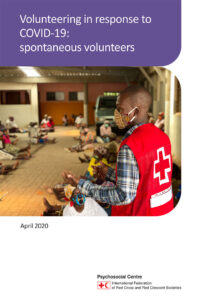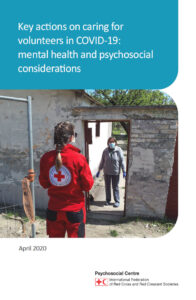
International Volunteer Day is an opportunity to acknowledge the valuable contributions that volunteers have made to the Red Cross Red Crescent Movement. Without its volunteers, the Movement would not be able to carry out its work to local communities throughout the world. It is therefore equally important for National Societies to establish a robust volunteer care system. The COVID-19 pandemic has shed light on the importance of MHPSS interventions in field operations, but also for staff and volunteers working directly with those in need.
Red Cross and Red Crescent volunteers have demonstrated immense compassion and courage throughout this pandemic – even as they contend with the impact of the virus on their own lives and families. Even though our daily lives have been turned upside down by the coronavirus, our volunteers have remained a constant support in their communities. The PS Centre has therefore compiled information and tools on MHPSS interventions in the context of COVID-19 and guidelines on how to support volunteers throughout these challenging times. This includes episodes from the Heartbeat of Humanity podcast, publications about MHPSS for volunteers and a short grounding exercise for volunteers to use when they are on-call with people in distress.
Podcast Episodes on Caring for Volunteers
The PS Centre’s podcast, called “Heartbeat for Humanity,” has published two episodes which explore how to achieve and maintain staff and volunteer well-being. All components within the Red Cross Red Crescent have a duty of care to its staff and volunteers. This includes ensuring their physical safety, health and well-being. The Red Cross and Red Crescent Movement has an obligation to provide volunteers with supportive supervision as well as necessary skills and competencies to effectively carry out their work.
The first episode is about caring for staff and volunteers in relation to international humanitarian law. It also emphasizes the importance in providing healthy work environments and establishing staff health policies to ensure a system that supports volunteers before, during and after deployment.
The second episode explores the buddy system and peer groups that have been implemented at the Ethiopian Red Cross to give staff and volunteers an open space in which they can share their experiences and connect with others. This episode also discusses the need to develop a comprehensive dynamic initiative that captures the complexities of working within humanitarian contexts. MHPSS interventions are a critical part of this development and they ensure a happy and healthy environment that supports staff and volunteers to continue their work.
Subscribe to the Heartbeat of Humanity podcast on Apple Podcast, Spotify, Google Podcast or wherever you find your podcasts.
Volunteers in times of COVID-19
The COVID-19 pandemic has led to an unprecedented humanitarian need. However, the Red Cross and Red Crescent Movement has witnessed equally unprecedented acts of humanity and kindness. Hundreds of thousands of new volunteers worldwide have joined their local Red Cross and Red Crescent society this year to help their communities during COVID-19. National Societies have reported a significant upward trend in volunteer sign ups – proving that even in these darkest of times, there are incredible stories of kindness and hope.
The PS Centre has created the following publications to help National Societies in caring for their volunteers, as they are welcoming a significant influx of new members in the midst of a global pandemic.
Volunteering in response to COVID-19: spontaneous volunteers
A leaflet introducing new volunteers responding to COVID-19 to the Red Cross Red Crescent Movemement and gives basic information about being a volunteer.
This leaflet provides a brief introduction for new volunteers who are responding to COVID-19. It includes basic information about volunteering for the Red Cross Red Crescent Movement, such as sharing a commitment to the seven fundamental principles of the Movement. It also provides a guideline for new volunteers in relation to accepting assigned tasks, ensuring safety, respecting confidentiality, protecting children and partaking in the news media. This leaflet also emphasizes the importance in ensuring psychosocial support, especially throughout COVID-19. Since volunteers may be in contact with people who are struggling to find ways to cope with the pandemic, the leaflet provides various advice to best assist those in need.
Key actions on caring for volunteers in COVID-19: mental health and psychosocial considerations
While the Red Cross and Red Crescent volunteers provide services to people affected by the COVID-19 pandemic, National Societies are responsible to ensure their well-being. Their level of coping depends on personal resources and resilience, as well as support available at home, in the community and from the National Society. Without support, volunteers likely become disillusioned and perform less well, ultimately leaving the teams with a higher turn-over rate.
This is a quick reference tool for National Societies in providing effective care and support to volunteers during the different phases of a COVID-19 response. It provides guidelines to assist volunteers before, during and after a crisis. This includes key preparatory actions before a response phase begins, as well as key factors that support the mental health of volunteers both during and after the response phases.
A short grounding exercise
This short grounding instruction aims to help volunteers and helpers on call to assist someone in distress. Should a caller need a moment to focus, try this – provided the caller accepts the suggestion.
The instruction should last for a minute and a half, so allow some time between each sentence.
- Let’s do a short grounding exercise together. This may help you focus on our talk so I can better assist you.
- Could I ask you to stand up and place both feet on the ground
- Soften the knees a bit
- Take a deep breath in to the bottom of the lungs and exhale the air slowly
- Send your attention to the soles of the feet – feel the contact with the surface they are resting on – it can be your footwear or the ground
- Imagine there are roots from the soles of your feet and into the ground
- These roots anchor you to the ground
- Take a moment to savour the sensation of being in contact with the ground.
- Now let’s continue talking – how was the grounding exercise for you – are you ready to go on?
Practice the instruction with a peer a couple of times before using it with a caller.
In light of International Volunteers Day on December 5th, we’d like to thank all of our volunteers for the valuable work that you do to support others.
We are very grateful for your time and dedication!



